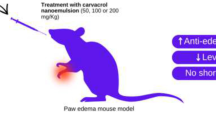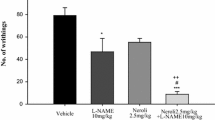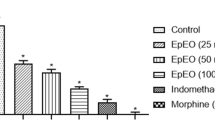Abstract
We evaluate the anti-inflammatory and antialgic potency of a nanoemulsion (NEORO) containing the essential oil of Rosmarinus officinalis L. (EORO), which is composed primarily of limonene, camphor and 1,8-cineole. The EORO and NEORO were administered orally 30 min prior to starting the experiments. In a test of rat paw oedema induced by carrageenan, NEORO was effective in doses of 498 µg/kg, and it inhibited 46% of the maximum peak of the oedema; in a dose of 300 mg/kg, EORO inhibited 50% of the maximum peak of the oedema. In an acetic acid-induced writhing test, NEORO yielded a dose-dependent effect, and a dose of 830 µg/kg inhibited 84% of the algesic process; a dose of 100 mg/kg of EORO inhibited 55%. In an assay for H2S production in rat stomachs, a dose of 498 µg/kg of NEORO inhibited H2S production in all of the measurement phases, and a dose of 100 mg/kg EORO inhibited 60% and influenced the effect of the ethanol significantly, reducing the production of H2S. We suggest that NEORO potentiated the effect of EORO, demonstrating effectiveness in doses 600 times lower than those applied with EORO. Among the major compounds of EORO, the camphor molecule exhibited the largest number of interactions with the therapeutic targets related to the inflammatory process, suggesting that it is responsible for EORO’s anti-inflammatory and antialgic effects. This work paves the way for future investigations related to the therapeutic role of NEORO in the inflammation process.








Similar content being viewed by others
References
American Veterinary Medical Association (2013) Guidelines for the Euthanasia of Animals: 2013 Edition. 48–50
Assis LM, Zavareze ER, Prentice-Hernández C, Souza-Soares LA (2012) Characteristics of nanoparticles and their potential applications in foods. Braz J Food Technol 15:99–109
Bissantz C, Kuhn B, Stahl M (2010) A medicinal chemist’s guide to molecular interactions. J Med Chem 53(14):5061–5084
Boix YF, Victório CP, Lage CLS, Kuster RM (2010) Volatile compounds from Rosmarinus officinalis L. and Baccharis dracunculifolia DC. Growing in southeast coast of Brazil. Quím Nova 33:255–257
Brumfiel G (2006) Consumer products leap aboard the nano bandwagon. Nature 440:262
Chandak N, Kumar P, Kaushik P, Varshney P, Sharma C, Kaushik D, Jain S, Aneja KR, Sharma PK (2014) Dual evaluation of some novel 2-amino-substituted coumarinylthiazoles as anti-inflammatory–antimicrobial agents and their docking studies with COX-1/COX-2 active sites. J Enzym Inhib Med Chem 29:476–484
Cleff MB, Meinerz ARM, Madrid I, Fonseca AO, Alves GH, Meireles MCA, Rodrigues MRA (2012) Perfil de suscetibilidade de leveduras do gênero Candida isoladas de animais ao óleo essencial de Rosmarinus officinalis L. Rev Bras Planta Med Botucatu 14(1):43–49
Cole JC, Nissink JWM, Taylor R (2005) Protein-ligand docking and virtual screening with GOLD. In: Alvarez J, Shoichet B (eds) Virtual Screening in Drug Discovery. CRC Press, Boca Raton, Fla, pp 379–415
De Faria LRD, Lima CS, Perazzo FF, Carvalho JCT (2011) Anti-inflammatory and antinociceptive activities of the essential oil from Rosmarinus officinalis L. (Lamiaceae). Int J Pharm Sci Rev Res 7:2
De Villiers MN, Aramwit P, Kwon GS (eds) (2009) Nanotechnology in drug delivery. Springer & AAPS Press, NY, p 663p
Du J, Yu Y, Ke Y, Wang C, Zhu L, Qian ZM (2007) Ligustilide attenuates pain behavior induced by acetic acid or formalin. J Ethnopharmacol 112:211–214
Duarte JL, Amado JRR, Oliveira AEMFM, Cruz RAS, Ferreira AM, Souto RNP, Falcão DQ, Carvalho JCT, Fernandes CP (2015) Evaluation of larvicidal activity of a nanoemulsion of Rosmarinus officinalis essential oil. Rev Bras Farmacogn 25:189–189
Duncan TV (2011) Applications of nanotechnology in food packaging and food safety: barrier materials, antimicrobials and sensors. J Colloid Interface Sci 363:1–24
Eto K, Kimura H (2002) A novel enhancing mechanism for hydrogen sulfide-producing activity of cystathionine beta-synthase. J Biol Chem 277:42680–42685
Falcão AP, Chaves ES, Kuskoski EM, Fett R, Falcão DL, Bordignon-Luiz T (2007) Índice de polifenóis, antocianinas totais e atividade antioxidante de um sistema modelo de geléia de uvas. Ciênc Tecnol Aliment 27:637–642
Fares M, Said MA, Alsherbiny MA, Eladwy RA, Almahli H, Abdel-Aziz MM, Ghabbour HA, Eldehna WM, Abdel-Aziz HA (2016) Synthesis, biological evaluation and molecular docking of certain sulfones as potential nonazole antifungal agents. Molecules 21:1–16
Fernandes CP, Mascarenhas MP, Zibetti FM, Lima BG, Oliveira RPRF, Rocha L, Falcão DQ (2013) HLB value, an important parameter for the development of essential oil phytopharmaceuticals. Braz J Pharm 23(1):108–114
Fiorucci S, Antonelli E, Distrutti E, Rizzo G, Mencarelli A, Orlandi S, Zanardo R, Renga B, Di Sante M, Morelli A, Cirino G, Wallace JL (2005) Inhibition of hydrogen sulfide generation contributes to gastric injury caused by anti-inflammatory nonsteroidal drugs. Gastroenterology 129(4):1210–1224
Fiorucci S, Distrutti E, Cirino G, Wallace JL (2006) The emerging roles of hydrogen sulfide in the gastrointestinal tract and liver. Gastroenterology 131:259–271
Ganguly A, Al Mahmud Z, Muhammad Nasir Uddin M, Abdur Rahman SM (2013) In-vivo anti-inflammatory and anti-pyretic activities of Manilkara zapota leaves in albino Wistar rats. Asian Pac J Trop Dis 3(4):301–307
Gauch LMR, Silveira-Gomes F, Esteves RA, Pedrosa SS, Gurgel ESC, Arruda AC, Marques-Da-Silva SH (2014) Effects of Rosmarinus officinalis essential oil on germ tube formation by Candida albicans isolated from denture wearers. Rev Soc Brasil Med Trop 47(3):389–391
Irache JM, Esparza I, Gamazo C, Agüeros M, Espuelas S (2011) Nanomedicine: novel approaches in human and veterinary therapeutics. Vet Parasitol 180:47–71
Izquierdo P, Esquena J, Tadros TF, Dederen C, Garcia MJ, Azemar N, Solans C (2002) Formation and stability of nano-emulsions prepared using the phase inversion temperature method. Langmuir 18:26–30
Juerges UR, Dethlefsen U, Steinkamp G, Gillissen A, Repges R, Vetter H (2003) Anti-inflammatory activity of 1.8-cineol (eucalyptol) in bronchial asthma: a double-blind placebo-controlled trial. Respir Med 97:250–256
Khan SU, Morris GF, Hidiroglou M (1980) Rapid estimation of sulfide in rumen and blood with a sulfide-specific ion electrode. Microchem J 25:388–395
Koster R, Anderson M, De Beer EJ (1959) Acetic acid for analgesic screening. Fed Proc 18:412–418
Kuang X, Yao Y, Du JR, Liu YX, Wang CY, Qian ZM (2006) Neuroprotective role of Z-ligustilide against forebrain ischemic injury in ICR mice. Brain Res 1102:145–153
Li L, Rossoni G, Sparatore A, Lee LC, Del Soldato P, Moore PK (2007) Anti-inflammatory and gastrointestinal effects of a novel diclofenac derivative. Free Radic Biol Med 42:706–719
Li YC, Chiang CW, Yeh HC, Hsu PY, Whitby FG, Wang LH, Chan NL (2008) Structures of prostacyclin synthase and its complexes with substrate analog and inhibitor reveal a ligand-specific heme conformation change. J Biol Chem 283:2917–2926
Lorenzi HE, Matos FJA (2002) Plantas medicinais no Brasil: Nativas e exóticas. Instituto Plantarum de Estudos de Flora, Nova Odessa, p 512
Machado DG, Cunha MP, Neis VB, Balen GO, Colla A, Bettio LEB, Oliveira A, Pazini FL, Dalmarco JB, Simionatto EL, Pizzolatti MG, Rodrigues ALS (2013) Antidepressant-like effects of fractions, essential oil, carnosol and betulinic acid isolated from Rosmarinus officinalis L. Food Chem 136:999–1005
Marchiori VF (2004) Rosmarinus officinalis. Monografia (Curso de Fitomedicina). Associação Argentina de Fitomedicina, Argentina, Fundação Herbarium, p 32
Martínez AL, González-Trujano ME, Pellicer F, López-Muñoz FJ, Navarrete A (2009) Antinociceptive effect and GC/MS analysis of Rosmarinus officinalis L. essential oil from its Aerial parts. Planta Med 75:508–511
McClements DJ (2012) Nanoemulsions versus microemulsions: terminology, differences, and similarities. Soft Matter 8:1719–1729
Melo GAN, Grespan R, Fonseca JP, Farinha TO, Silva EL, Romero AL, Bersani A, Cuman RK (2011) Rosmarinus officinalis L. essential oil inhibits in vivo and in vitro leukocyte migration. J Med Food 14(9):944–949
Napoli EM, Siracusa L, Saija A, Speciale A, Trombetta D, Tuttolomondo T, La Bella S, Licata M, Virga G, Leone R, Leto C, Rubino L, Ruberto G (2015) Wild Sicilian rosemary: phytochemical and morphological screening and antioxidant activity evaluation of extracts and essential oils. Chem Biodivers 12:1075–1094
Ojeda-Sana AM, Van Baren CM, Elechosa MA, Juarez MA, Moreno S (2013) New insights into antibacterial and antioxidant activities of Rosemary essential oil and their main components. Food Control 31:189–195
Orafidiya LO, Oladimeji FA (2002) Determination of the required HLB values of some essential oils. Int J Pharm 237:241–249
Orlando BJ, Malkowski MG (2016) Substrate-selective inhibition of cyclooxygenase-2 by fenamic acid derivatives is dependent on peroxide tone. J Biol Chem 291:15069–15081
Ostertag F, Weiss J, McClements DJ (2012) Low-energy formation of edible nanoemulsions: factors influencing droplet size produced by emulsion phase inversion. J Colloid Interface Sci 388:95–112
Patel AR, Velikov KP (2011) Colloidal delivery systems in foods: a general comparison with oral drug delivery LWT. Food Sci Technol 44:1958–1964
Patgiri B, Umretia BL, Vaishnav PU, Prajapati PK, Shukla VJ, Ravishankar B (2014) Anti-inflammatory activity of Guduchi Ghana (aqueous extract of Tinospora cordifolia Miers.). Int Q J Res Ayurveda 35:108–110
Rašković A, Milanović I, Pavlović N, Ćebović T, Vukmirović S, Mikov M (2014) Antioxidant activity of rosemary (Rosmarinus officinalis L.) essential oil and its hepatoprotective potential. BMC Complement Altern Med 14:225
Raut JS, Karuppayil SM (2010) A status on the medicinal properties of essential oils. Ind Crops Products 62:250–264
Ribeiro DS, Melo DB, Guimarães AG, Velozo ES (2012) Avaliação do óleo essencial de alecrim (Rosmarinus officinalis L.) como modulador da resistência bacteriana. Semina: Ciências Agrárias 33:687–696
Sandy M, Butler A (2009) Microbial Iron Acquisition: marine and Terrestrial Siderophores. Chem Rev 109:4580–4595
Solans C, Izquierdo P, Nolla J, Azemar N, Garcia-Celma MJ (2005) Nano-emulsions. Curr Opin Colloid Interface Sci 10:102–110
Solè I, Solans C, Maestro A, González C, Gutiérrez JM (2012) Study of nano-emulsion formation by dilution of microemulsions. J Colloid Interface Sci 376:133–139
Souza MT, Almeida JR, Araujo AA, Duarte MC, Gelain DP, Moreira JC, dos Santos MR, Quintas-Júnior LJ (2014) Structure–activity relationship of terpenes with anti-inflammatory profile—a systematic review. Basic Clin Pharmacol Toxicol 115:244–256
Tadros T, Izquierdo P, Esquena J, Solans C (2004) Formation and stability of nano-emulsions. Adv Colloid Interface Sci 108–109:303–318
Ventura-Martinez R, Rivero-Osorno O, Gómez C, González-Trujano ME (2011) Spasmolytic activity of Rosmarinus officinalis L. involves calcium channels in the guinea pig ileum. J Ethnopharmacol 137:1528–1532
Wallace JL (2007) Hydrogen sulfide-releasing anti-inflammatory drugs. Trends Pharmacol Sci 28:10
Wang L, Li X, Zhang G, Dong J, Eastoe J (2007) Oil-in-water nanoemulsions for pesticide formulations. J Colloid Interface Sci 314:230–235
Winter CA, Risley EA, Nuss GW (1962) Carrageenin-induced edema in hind paw of the rat as an assay for anti-inflammatory drugs. Proc Soci Exp Biol Med 111:544–547
Wolber G, Langer T (2005) LigandScout: 3-D pharmacophores derived from protein-bound ligands and their use as virtual screening filters. J Chem Inf Model 45:160–169
Yu Y, Du JR, Wang CY, Qian ZM (2008) Protection against hydrogen peroxide-induced injury by Z-ligustilide in PC12 cells. Exp Brain Res 184(3):307–312
Zaouali Y, Bouzaine T, Boussaid M (2010) Essential oils composition in two Rosmarinus officinalis L. varieties and incidence for antimicrobial and antioxidant activities. Food Chem Toxicol 48:3144–3152
Ziólkowski M, Grabowski SJ, Leszczynski J (2006) Cooperativity in hydrogen-bonded interactions: Ab initio and “atoms in molecules” analyses. J Phys Chem A 110(20):6514–6521
Acknowledgements
The authors acknowledge PNPD/CAPES (Program/Project: PNPD20130076-14001012005P1), CAPES (No. 3292/2013 AUXPE) and CNPq Proc. 402332/2013-0 for financial support and the Universidad Autônoma de México—Programa de Estancias de Investigación (PREI).
Author information
Authors and Affiliations
Corresponding author
Rights and permissions
About this article
Cite this article
Borges, R.S., Lima, E.S., Keita, H. et al. Anti-inflammatory and antialgic actions of a nanoemulsion of Rosmarinus officinalis L. essential oil and a molecular docking study of its major chemical constituents. Inflammopharmacol 26, 183–195 (2018). https://doi.org/10.1007/s10787-017-0374-8
Received:
Accepted:
Published:
Issue Date:
DOI: https://doi.org/10.1007/s10787-017-0374-8




